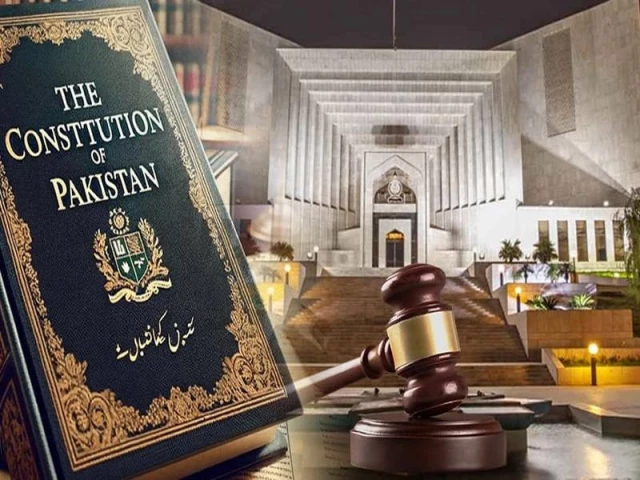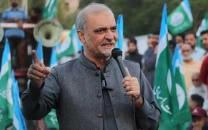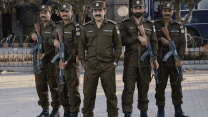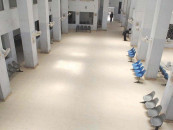SC verdict on military trials imminent
SC verdict on military trials imminent

A constitutional bench (CB) of the Supreme Court is going to announce within a week its short order in a case related to the trial of May 9 rioters by military courtsan order that will have significant implications for civil rights in the country.
A seven-member CBled by Justice Aminuddin Khanon Monday reserved its order after hearing some intra-court appeals filed by the Ministry of Defense and others against the October 2023 ruling of a larger SC bench that declared court-martial of May 9 accused illegal.
Earlier, Attorney-General for Pakistan (AGP) Mansoor Awan concluded his argument in favor of the trial of civilians by military authorities, noting that in its order the CB could propose to parliament to legislate in order to give the right to appeal to people convicted by military courts.
He informed the court that on May 9, 2023the day former prime minister Imran Khan was arrested from the premises of the Islamabad High Court (IHC)--attacks were carried out on 39 military installations across the country between 3pm and 7pm.
He said most of these attacks23 occurred in Punjab, followed by 8 in Khyber Pakhtunkhwa, 7 in Sindh and one in Balochistan.
According to the AGP, major military facilities attacked included the General Headquarters (GHQ) in Rawalpindi, the Corps Commander's House in Lahore, the Mianwali Air Force Base, and ISI offices in Faisalabad, Sargodha, and Rawalpindi.
He stated that the events of May 9 were executed with organized planning.
The AGP said the attack on the Corps Commander's House in Lahore occurred at 5:40 pm and the Lahore Corps remained non-functional from that time until 9 pm.
He noted that in Pakistan's history, a former prime minister, Zulfikar Ali Bhutto, was executed yet no such violent reaction occurred.
In 2007, another former PM, Benazir Bhutto, was assassinated in Rawalpindi, and during the Movement for the Restoration of Democracy (MRD), political parties were banned, leaders imprisoned, and public dissent suppressedbut even then, no actions of this scale were taken.
He argued that even if May 9 was a reaction such acts could not be condoned. Pakistan, he said, is not an ordinary country and faces constant threats due to its geographical location.
Justice Jamal Khan Mandokhail remarked that the court is not debating whether a crime occurred as that was not in question. He asked the AGP to focus on the appeal itself. Awan responded that while the matter may not be directly in question, it is still important to address.
He informed the court that disciplinary action had been taken by the military over negligence in the Jinnah House attack and three senior officersincluding a lieutenant general, a brigadier and a lieutenant colonelwere forcibly retired without pension or benefits.
"The performance of 14 other officers was deemed unsatisfactory. Being marked as 'undesirable' or 'untrusted' means no further advancement in the military career is possible," he said.
Justice Mandokhail asked whether any criminal proceedings had been initiated against those officers. The AGP replied that criminal proceedings occur only when a crime has been committed. He said the actions taken were administrative based on their failure to prevent the events.
Justice Mandokhail observed that the Pakistan Army Act, 1952 clearly states that criminal punishment can accompany departmental proceedings.
Justice Musarrat Hilali asked whether the gate of Jinnah House had been breached or opened from within. "If it was opened from inside," she said, "then that constitutes collusion." The AGP said he would verify and report back.
Justice Mandokhail asked if what happened on May 9 was done with criminal intent or if it was a protest that escalated beyond control. The AGP said what happened on May 9 was indeed a crime.
Justice Naeem Akhtar Afghan criticized the AGP's approach, saying he had taken the wrong path.
"We have not allowed anyone to debate the merit of the May 9 incident here," he said, warning that doing so could affect trial and appeal proceedings. He noted that delving into the details of May 9 would raise many questions that might not be easy for the AGP to answer.
Justice Afghan asked whether the corps commander Lahore was among those forcibly retired without pension. The AGP replied in the affirmative.
Justice Musarrat Hilali remarked that while amending the Constitution is difficult, it was done. "So why has not the law, particularly the Official Secrets Act, 1923 been amended to facilitate necessary changes?" she asked.
The AGP said appeals against sentences from military courts had already been filed and time concessions would be given to others.
He requested that the CB issue an observation in favor of the right to appeal. He said the Supreme Court had done that earlier when it asked parliament to legislate within six months with regard to extending the tenure of former army chief Qamar Javed Bajwa.
Justice Muhammad Ali Mazhar noted that, in that case, parliament was explicitly instructed and given a timeframe. Justice Aminuddin Khan noted that if the law itself has been invalidated, the question of appeal does not arise.
Hafeezullah Niazi, one of the respondents, intervened, pointing out that during the 2014 sit-in, attacks were carried out on the Prime Minister's House, parliament, and a television station and there was even a plan to forcibly remove the prime ministerbut those cases were tried in regular courts.
Later, Justice Aminuddin Khan, after consulting with fellow judges, reserved judgment and stated that a short order would be issued within the week.
























COMMENTS
Comments are moderated and generally will be posted if they are on-topic and not abusive.
For more information, please see our Comments FAQ